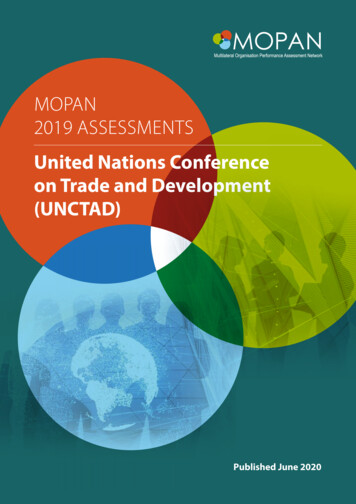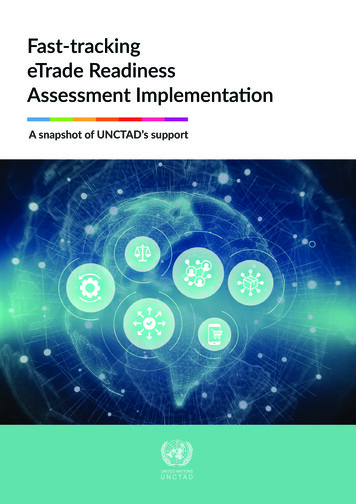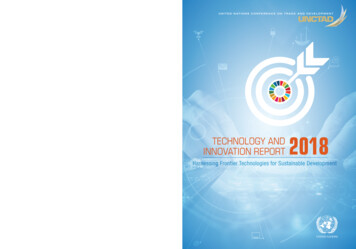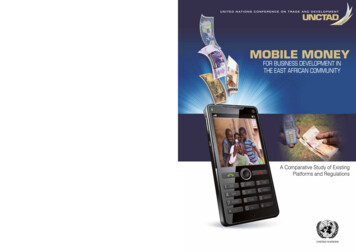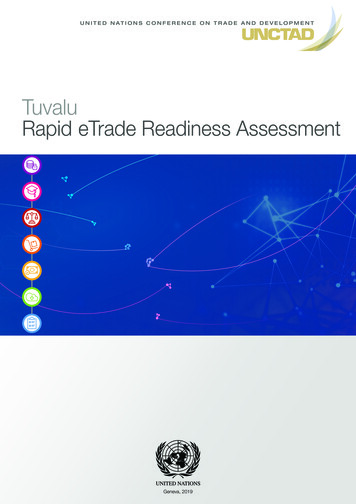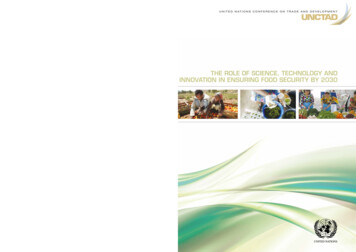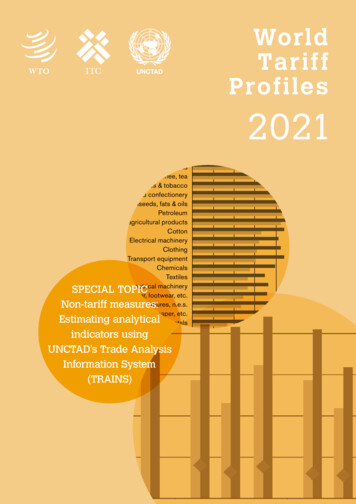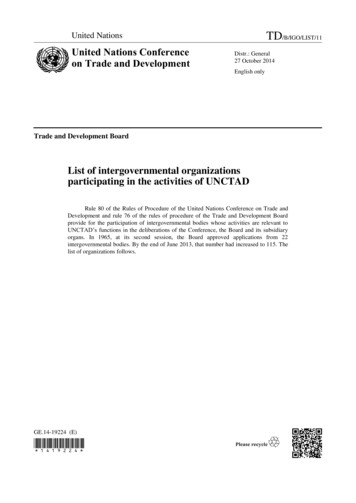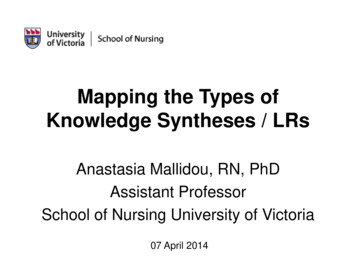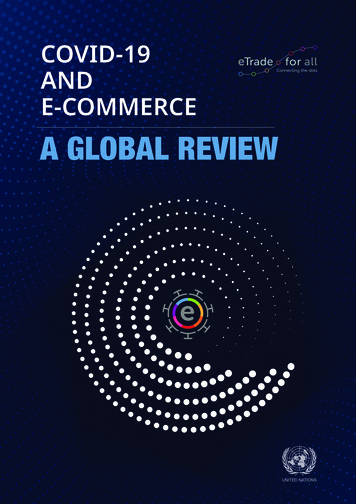
Transcription
COVID-19ANDE-COMMERCEA GLOBAL REVIEW
COVID-19ANDE-COMMERCEA GLOBAL REVIEWGENEVA, 2021
2021, United NationsAll rights reserved worldwideRequests to reproduce excerpts or to photocopy should be addressedto the Copyright Clearance Center at copyright.com.All other queries on rights and licences, including subsidiary rights, should be addressed to:United Nations Publications405 East 42nd StreetNew York, New York 10017United States of AmericaEmail: publications@un.orgWebsite: https://shop.un.org/The designations employed and the presentation of material on any map in this work do not imply theexpression of any opinion whatsoever on the part of the United Nations concerning the legal status of anycountry, territory, city or area or of its authorities, or concerning the delimitation of its frontiers or boundaries.This publication has been edited externally.United Nations publication issued by the United Nations Conference on Trade and Development.UNCTAD/DTL/STICT/2020/13ISBN: 978-92-1-113013-3eISBN: 978-92-1-005689-2Sales no.: E.21.II.D.9eTrade for all3
NOTESWithin the UNCTAD Division on Technology and Logistics, the ICT Policy Section carries out policy-orientedanalytical work on the development implications of e-commerce and the digital economy. It is responsible forthe preparation of the Digital Economy Report as well as thematic studies on ICT for Development. It promotesinternational dialogue on related issues and contributes to building the capacities of developing countries toharness the evolving digital economy.The Section also coordinates the eTrade for all initiative (etradeforall.org), which is a collective effort to raiseawareness and enhance synergies among development partners to strengthen the ability of developing countriesto engage in and benefit from e-commerce and the digital economy. Gathering 32 partners, it acts as a globalhelpdesk and as a catalyst of partnership. Its two main spin-offs are: 1) the eTrade Readiness Assessments thatprovide national basic diagnostics of the current e-commerce situation in a country, identify opportunities andchallenges and provides policy recommendations; 2) the eTrade Women Initiative to empower women digitalentrepreneurs in developing countries.eTrade for all partners are also key contributors to the UNCTAD’s eCommerce Weeks, the leading global andregional platforms to discuss the digital transformation associated with e-commerce and the digital economy.Reference to companies and their activities should not be construed as an endorsement by UNCTAD of thosecompanies or their activities.The following symbols have been used in the tables:Two dots (.) indicate that data are not available or are not separately reported. Rows in tables have been omittedin those cases where no data are available for any of the elements in the row;A dash (-) indicates that the item is equal to zero or its value is negligible;Reference to “dollars” ( ) means United States of America dollars, unless otherwise indicated;Details and percentages in tables do not necessarily add up to the totals because of rounding.4A GLOBAL REVIEW
PREFACEThe COVID-19 pandemic has accelerated digital transformations. Digital solutions are increasingly neededto continue some of the economic and social activities remotely. They have been critical for telemedicine,telework and online education, not least to keep alive our social ties in times of physical distancing. We havealso witnessed e-commerce growth in developing countries, with long-term implications. However, unlessadequately addressed, existing digital divides are likely to result in even greater inequalities.Against this background, a group of eTrade for all partners joined forces in the midst of the COVID-19 outbreak,with the aim of jointly assessing how the impact of the pandemic was playing out in various regions of theworld, what barriers countries and business were facing when trying to leverage digital solutions; what policyresponses had been taken; and – not least important – what we could do better to reap synergies and enhanceglobal support to those countries that are the least equipped to manage digital transformation for dealing withthe pandemic and beyond.This study on the impact of COVID-19 on e-commerce and digital trade is a collective effort, and the firstresearch-oriented project undertaken under the eTrade for all umbrella. The work has been led by the UnitedNations Conference on Trade and Development and the United Nations Regional Commission for Latin Americaand the Caribbean, drawing also on regional reports prepared by the United Nations Economic Commission ofAfrica, the United Nations Commission of Europe and the United Nations Economic and Social Commission forWestern Asia. Valuable inputs and comments were also received from e-Residency of Estonia, the InternationalTrade Centre, the United Nations Economic and Social Commission for Asia and the Pacific and the UniversalPostal Union.The critical global policy challenge that emerges from this study is that greater efforts are needed to help reduceinequalities in e-trade readiness that currently prevail amongst countries. All stakeholders – governments,businesses, consumers and international development partners – have a responsibility to ensure thate-commerce plays a positive and powerful role in national and international recovery efforts. Resources shouldbe committed to that goal.The pandemic has also demonstrated the importance of ensuring consistency and avoiding duplication ininternational efforts. Over the past four years, the eTrade for all has shown the potential for collaboration to addvalue, especially in LDCs. The initiative will continue to play its part by advocating relevant policy approaches,supporting assessments of national e-commerce environments, and fostering collaborations between nationaland international stakeholders to maximize the synergies that can contribute to enabling e-commerce fordevelopment.Shamika N. SirimanneDirectorDivision on Technology and LogisticsUNCTADeTrade for all5
ACKNOWLEDGEMENTThis project was prepared by a team led jointly by Torbjörn Fredriksson and Sabrina Ielmoli (UNCTAD) andNanno Mulder (UNECLAC), comprising Alejandro Patino (UNECLAC), Jamie Alexander Macleod (UNECA), AymanElsherbiny and Rita Wehbe (UNESCWA), Maria Rosaria Ceccarelli and Khan Salehin (UNECE), and James Howe(ITC) and Mari Luist (e-Residency of Estonia).The working group also included and benefitted from inputs by Mia Mikic and Tengfei Wang (UNESCAP), PaulDonohoe and Alexander Then-Svanberg (UPU).David Souter and Anri Van der Spuy were lead consultants for this report.Guy Futy was lead consultant for the regional report from UNECA.Deepali Fernandes was lead consultant for the regional report from UNECE.Bernardo Díaz de Astarloa was lead consultant for the regional report from UNECLAC.Ahmed Sobky was lead consultant for the regional report from UNESCWA.The project team would also like to acknowledge the additional comments made to the global report by CécileBarayre, Alessandro Vitale, Iris Macculi, Martine Julsaint-Kidane and Jan Hoffmann from UNCTAD .Desktop publishing and the cover were prepared by Natalia Stepanova. The document was edited by NancyBiersteker.Financial support from the Government of Estonia and the Konrad Adenauer Stiftung is gratefully acknowledged.6A GLOBAL REVIEW
The global review of the impact of COVID-19 on e-commerceKey findings from the study conducted by UNCTAD and eTrade for all partnersThe digital economy and e-commerce are at the heartof the SDGs, bringing both opportunities and challengesTHE PANDEMIC HASREINFORCED THEIMPORTANCE OFADDRESSINGEXISTING BARRIERSTO E-COMMERCE.Better access to globalmarkets for goods andservicesWidening digitaldivides with increasedincome inequalityElimination of jobsand tasks due toautomationIncreased shareof online retailCOUNTRIES THATHARNESS THEPOTENTIAL OFE-COMMERCE WILLBE BETTER PLACEDTO BENEFIT FROMDIGITAL ECONOMYOPPORTUNITIES.SDGsConsumer protection,data privacy & cybercrimeAcceleration ofthe digitaltransformationDespite the global recession, the pandemic has led to a further acceleration ofdigital transformationGLOBAL ECONOMICIMPACT-4.3% in 2020GLOBAL GDPGlobal tradein goods-9%in 2020Global tradein servicesLATINAMERICAMercado LibreArticles sold per day-15%REGIONALTRENDS201920202nd quarterJumiaVolume of transactionsGLOBAL TRENDSShare in global lEntertainmentOnline conferencing2020AugustKazakhstanOnline share of retail2019AugustOTHER SECTORSGaming2019AugustFirst 6 months2020AugustThailandDownloads ofshopping appsFurther acceleration of digitaltransformations in:TeleworkingChinaOnline share of retailAFRICAin 2020ECOMMERCEASIASimilar observations were made in manydeveloped countries.2020February2020March
The accelerated trend towards e-commerce is likely tobe sustained during recovery 50% OF CONSUMERSexpect to continue SHOPPINGMORE OFTEN online than they didbeforeThe benefits from thisuptake will depend onE-COMMERCE PLATFORMScountries’ digitalare likely to retainreadiness andmany of the gains inmarket shareenabling environmentvis-à-vis offlinemarketsfor e-commerce 40%OF CONSUMERSsay they will spend moretime on ONLINE ENTERTAINMENT services after thecrisisIn fact, businesses that coped the best with the crisis were highlyprepared and supported by coherent e-commerce strategiesBusinesses with anESTABLISHEDONLINE PRESENCETraditional businesseswith sufficientresources to upgradetheir ONLINE MARKETINGAND SALESCOMMUNICATIONSNETWORK and DIGITALPLATFORMSEconomies withEconomies withEconomies that havehigh levels ofINTERNET ADOPTIONcoherentE-COMMERCEprioritized e-commerceSTRATEGIES in placedevelopment throughCOORDINATED ACTIONSBusinesses thatovercame TRADE ANDTRANSPORT LOGISTICSISSUESTHE PANDEMIC HAS REINFORCEDTHE IMPORTANCE OF ADDRESSINGEXISTING BARRIERS TOE-COMMERCE IN ORDER TOLEVERAGE THE BENEFITS OF THEDIGITAL ECONOMY
The pandemic has reinforced the importance of addressingexisting barriers within a holistic multi-stakeholder approachacross the whole e-commerce value chainCROSS-CUTTING APPROACHE-commerce readiness assessmentsand strategy formulationeTrade for all A global partnershipfor the Covid-19pandemic recoveryICT infrastructure and servicesPayment solutionsTrade logistics and tradefacilitation32 eTrade for all partners,major global actors in thedigital economy and e-commerce field.E-commerce skills developmente-commerceTAKES ACTION through capacitybuilding and assistance toaddressknowledgeandoperational gaps.FOSTERS SYNERGIES among theLegal and regulatoryframeworksAccess to financing forANALYSES AND INFORMS about therisks emerged during thecrisis. Collects evidence.Since the outbreak of the pandemic, MORE THAN 30 ETRADE FOR ALL PARTNERS havebeen working together to raise awareness and identify ways in which businesses indeveloping and least developed countries could overcome the challenges.Empowering womenentrepreneurs indeveloping countriesDISCOVER THEIR RECOMMENDATIONSPriority actions for governmentsSystematic DATA GATHERINGand evaluation of the impactof policies and business practicesIdentification of CRITICAL GAPS thatrequire interventionEstablishing/developing STRATEGIES FORE-COMMERCE that are integrated intobroader national developmentFostering MULTI-STAKEHOLDER DIALOGUEand strengthening the INTER-MINISTERIALDIALOGUE for effective coordinationFacilitating PUBLIC/PRIVATE PARTNERSHIPSto build awareness and trust in e-commerce among both merchants andconsumersRecommendations for the private sectorBUSINESSES IN DEVELOPING COUNTRIES NEED TOBECOME BETTER EQUIPPED TO PARTICIPATE IN THEDIGITAL ECONOMYFaster digitalizationfor smallerbusinessesBetter capabilitiesto capture andharness dataMore attention todigital entrepreneurship (includingreskilling)Stronger regulatoryframeworks forcreating and capturing value in thedigital economyInternational communityNeeds to find new, bold and smart ways to workwith governments and the private sector toleverage these opportunities.
TABLE OF CONTENTSNOTES . 4PREFACE. 5ACKNOWLEDGEMENT . 61 INTRODUCTIONThe impact of the pandemic . 11The pandemic and e-commerce .11E-commerce and development .12UNCTAD and the eTrade for all initiative.14NOTES . 152 GLOBAL AND REGIONAL TRENDSThe evidence base.20Part 1 – Global and national economic and trade trends .23Part 2 – Trends in e-commerce .33Part 3 – Regional trends before and during the pandemic .44NOTES . 513 CHALLENGES, RESPONSES AND STRATEGIES FOR RECOVERYSection A E-commerce readiness assessment and strategy formulation.65Section B ICT Infrastructure and services .70Section C Payments.77Section D Trade logistics.84Section E Legal and regulatory frameworks .93Section F Skills development.98SECTION G Financing for e-commerce.102SECTION H Empowering women in e-commerce.107NOTES.1124 THE WAY FORWARD: LEVERAGING ETRADE FOR ALLMain findings.124The eTrade For All Initiative . 126Responding to policy challenges: main recommendations . 128Goals and policy recommendations. 134NOTES . 136REFERENCES . 137
1Introduction8A GLOBAL REVIEW
MainMessagesThe digital economy and e-commerce play a growing role in efforts to achieve theSustainable Development Goals (SDGs), bringing both new opportunities and newchallenges. Countries that harness the potential of e-commerce will be better placed tobenefit from global markets for their goods and services in this digitalizing economy,while those that fail to do so risk falling behind.The COVID-19 pandemic has dominated global economic development during 2020.Restrictions on movement and other interventions to protect public health havereduced economic activity in most sectors and most countries, affecting production,distribution and consumption, with greater impact in countries that were less wellprepared to deal with crisis.The pandemic caused a sharp deceleration in economic activity for which economieswere largely unprepared. One impact within this, however, has been an uptake ine-commerce resulting from the need for much activity to move online. It seems likelythat the accelerated trend towards e-commerce seen during the pandemic will besustained during recovery.The eTrade for all initiative, established in 2016, which aims to address knowledgegaps regarding e-commerce and foster synergies among the partners, is moreneeded than ever in efforts to recover from the pandemic. Since the outbreak ofthe pandemic, UNCTAD and its 32 eTrade for all partners have played an importantrole in raising awareness of the opportunities and risks for e-commerce that haveemerged during the crisis and have worked together to improve understanding ofthe challenges faced by e-commerce businesses in developing and least developingcountries (LDCs). This has reinforced the growing importance of e-commerce and theneed for action, supported by international development partners, to build upon it.eTrade for all9
The digital economy and e-commerce play a growing role in effortsto achieve the Sustainable Development Goals (SDGs), bringingboth new opportunities and new challenges to bear. As UNCTAD’sInformation/Digital Economy Reports and other international studies haveshown1, future economic prosperity in all countries will depend substantiallyon the facilitation and exploitation of these digital developments2 .The last decade has seen accelerating transition towards a digital economyin which information and communications technologies (ICTs) play a growingpart in the production, consumption and exchange of the majority of goodsand services 3. Estimates of the size of the digital economy vary considerably,ranging from 4.5 to 15.5 per cent of world GDP4 , because of differences indefinition and challenges of measurement, while the share of digitally deliveredservices in total exports of services has risen from 45 per cent to 52 per centbetween 2005 and 20195. This transition has been unevenly spread, however,more rapid and more extensive in developed countries and high-incomedeveloping countries than elsewhere.E-commerce has great potential for diversifying the scope and geographicreach of trading opportunities for developing countries and expandingthe range of both established businesses and new enterprises. It also playsan increasingly important role in the supply and distribution of both goodsand services in domestic markets.6 The growth of e-commerce is inhibited,however, in many developing countries by a range of barriers in infrastructure,finance, resources and governance. Countries that overcome these barriersand establish enabling frameworks for e-commerce will be better placed toleverage its potential benefits and address challenges, both domesticallyand internationally, while those that fail to do so risk becoming less dynamicat home and less competitive abroad.7 In the absence of measures to takeadvantage of e-commerce, there is a risk that digital innovations will increaseinequality rather than advancing equity.10A GLOBAL REVIEW
THE IMPACT OF THE PANDEMICThe COVID-19 pandemic has dominated globaleconomic development during 2020. Restrictionson movement and other interventions to protectpublic health have reduced economic activity in mostsectors and most countries, affecting production,distribution and consumption.8 The global economyis predicted to shrink by at least four per cent over theyear, rather than growing by four per cent or moreas previously anticipated.9 Global trade in goods fellby almost 18 per cent in May 2020 (compared withthe same month in 2019).10 Developing countries andLDCs – and their citizens – are particularly vulnerableto recessions in global economic activity.11commitment by both governments and business.Various regions and countries have been affecteddifferently by COVID-19, depending on timing andseverity,14 while the pandemic’s future trajectory andimpact on economic growth, employment and socialwelfare are unpredictable. Some countries, notablyin the Asia-Pacific region, have seen relatively lowinfection rates in recent months that have enabledmore rapid restoration of pre-pandemic levels ofeconomic activity than others,15 notably in Europeand the Americas, which were suffering a secondwave of COVID-19 infections by late 2020. Smallisland states in the Caribbean have seen high rateseconomicof infection while those in the Pacific had been largelydownturns struck at a time of changing economicspared at time of writing.16 These different intensities12circumstances and increasing economic challenge.and timings of infection have had, and will continueGlobal GDP had been growing at an average of justto have, a significant bearing on economic outcomes.Thepandemicanditsassociatedover 3.5 per cent each year during the previousdecade, but recovery from the crisis of 2008/9 hasbeen sluggish in developed countries, limiting growthin global demand.13 Uncertainties concerning futuretrade relationships among major economies havecome to the fore. Long-term challenges, includingclimate change, require large-scale adjustments inproduction and consumption where achievementThe United Nations and many governments havemade clear their determination that recovery fromthe pandemic should reach beyond restoration of thestatus quo before the crisis. Rather, in the words ofthe Secretary-General, the international communityshould ‘turn the recovery into a real opportunity todo things right for the future’.17will depend on international cooperation andTHE PANDEMIC AND E-COMMERCEThe pandemic caused a sharp deceleration inin the eTrade for all initiative, analyses by othereconomic activity for which economies were largelymultilateral agencies, and research undertaken byunprepared. One impact within that overall reductionUnited Nations Regional Commissions. In addition toof activity, however, which has significance boththis introduction, it includes three chapters:during the pandemic and for subsequent recovery,has been an uptake in e-commerce resulting fromthe need for much activity to move online.This report makes a preliminary assessment of theimpact of the COVID-19 crisis on e-commerce, drawingon the limited range of data currently available.18 Itincludes surveys of e-commerce businesses andconsumers conducted by UNCTAD and its partnersCHAPTER 2 summarizes global and regional trendsthat can be identified to date.CHAPTER 3 considers principal challenges arisingfrom these and the pandemic; policy responses tothem by governments, businesses and vernments and other stakeholders can strengthencapacity, resilience and recovery from the pandemic.eTrade for all11
This chapter includes separate sections addressingon approaches to e-commerce that can supporteight critical challenges requiring such responses.global and national economic recovery when theCHAPTER 4 charts a way forward and offers recommendations to different stakeholder communities.The report summarizes what we know to date,outlines what this indicates for policymakers indiversestakeholdercommunitiesandreflectspandemic eventually recedes. Its conclusion, andthose of associated regional reports publishedby the Regional Commissions,19 are necessarilyprovisional but intended to stimulate discussionand the deployment of appropriate policy initiatives,particularly in developing countries and LDCs.E-COMMERCE AND DEVELOPMENTUNCTAD adopts a broad definition of the digitalinstance for e-commerce), which can be described aseconomy with three main elements, illustratedexperiencing digitalization.20 The growing prevalencein Figure 1.1: its underlying technologies andof digitalization makes it increasingly difficult toinfrastructures,sectorsdistinguish this digital economy from economicthemselves, and the wider range of sectors in whichactivity in general, and therefore difficult to quantify.theICTanddigitaldigital products and services are in growing use (forFigure 1.1A representation of the digital economy 21Growth in the digital economy has been driven byfour main factors:12 the accelerating pace of digital innovation increased online participation,A GLOBAL REVIEW rapid growth in data gathering andtransmission, the emergence of platforms that facilitateinnovation and/or intermediate in onlinemarkets.
The proportion of individuals worldwide engagingThe increasing significance and rapid growth ofwith the Internet is estimated to have risen from 29.3e-commerce in global economic activity are clear,per cent in 2010 to 53.6 per cent in weenInternet Protocol (IP) traffic, a proxy for data flows,different analysts. Its share of global retail trade isgrew from about 100 gigabytes per second in 2002 toestimated by eMarketer to have risen from 10.4 persome 88,000 gigabytes per second in early 2020. Ascent in 2017 to 14.1 per cent in 2019.26 Southeastthe pandemic spread during the year, with increasedAsia’s e-commerce sector is estimated to have growntraffic generated by teleworking, videoconferencing,six-fold between 2015 and 2019, reaching US 38digital entertainment and other applications, thisbillion in value, and is expected to be worth US 150figure is now estimated to exceed 100,000 gigabytesbillion by 2025.27per merce lies at the heart of the digitalgovernments and development partners28 to provideeconomy, defined by the Organisation for Economicnew ways of facilitating the SDGs set out in the 2030Cooperation and Development (OECD) as ‘theAgenda for Sustainable Development.29 Innovationssale or purchase of goods or services, conductedin technology and the modalities of commerce areover computer networks by methods specificallycreating opportunities for companies of all sizes todesigned for the purpose of receiving or placing ofengage in domestic and international trade throughorders.’24 Goods and services are ordered over thesethe adaptation of supply chains, lower trade costsnetworks, while payment and delivery may be onlineand extended market reach.or offline. This represents a complex and growingrange of economic activity. It includes, for instance: frictions at commercial interfaces, digital platforms –transactions between businesses (B2B), thosethose of individual sellers and third-party platformsbetween businesses and individual consumerssuch as Amazon and Alibaba – enable those offering(B2C),goods or services to connect more easily withandthosebetweengovernments,(potential) consumers and to expand the volume ofbusinesses and citizens (G2B, G2C); By reducing transaction and search costs as well asthe direct provision of services that can be tradedcommercial interactions.digitally, as well as the facilitation of ongoing andThe COVID-19 pandemic has altered trade patternsadditional trade in goods;substantially, at least in the short term.international commerce, between continentsIt has reduced the volume and shiftedand across land borders, as well as domesticthe balance of international trade,transactions, both wholesale and retail;disrupting traditional supply chains andtransactionsundertakenthroughglobalplatforms such as Amazon and Alibaba, throughregional intermediaries such as Jumia in Africa,Lazada in Southeast Asia and Mercado Librein Latin America, through wholesalers’ andretailers’ own online domains, and through smalltransactions between MSMEs and individualconsumers.It intersects with other aspects of the digital andanalogue economies in complex ways and relieson both physical infrastructure and enablingframeworks of policy, business practice and ansport, logistics and border controls.It has encouraged the growth of onlineshopping and services in domesticmarkets where movement controls andconsumer anxiety have discouragedphysical transactions. These trends areexplored in CHAPTER 2.It seems likely, though this is yetuncertain, that the accelerated trendtowards e-commerce seen during thepandemic will be sustained duringrecovery. Lessons learned from itshould therefore be important for future economicgrowth and for development. These are explored inCHAPTER 3.eTrade for all13
UNCTAD AND THE ETRADE FOR ALL INITIATIVEUNCTAD’s role is to maximize the trade, investmentdivides and spurring sustainable development.andPartners in eTrade for all have also contributed to 27developmentopportunitiesofdevelopingcountries and assist them in their efforts to integrateinto the world economy on an equitable basis. Since2016 it has focused extensively on the opportunitiesand challenges of the digital economy, by providingglobal platforms for dialogue, offering specialistadvice to governments and other stakeholders, andthrough its series of Information/Digital EconomyReports.UNCTAD eTrade Readiness Assessments.The scope and impact of e-commerce reach acrossthe range of economic activity. The eTrade for allinitiative has identified seven policy areas that arecrucial to enabling countries, particularly developingcountries and LDCs, to engage in and benefit morefully from the growth of online business activity:UNCTAD’s analysis, drawn from that experience, hasshown
4 A GLOBAL REVIEW Within the UNCTAD Division on Technology and Logistics, the ICT Policy Section carries out policy-oriented analytical work on the development implications of e-commerce and the digital economy. It is responsible for the preparation of the Digital Economy Report as well as thematic studies on ICT for Development. It promotes
